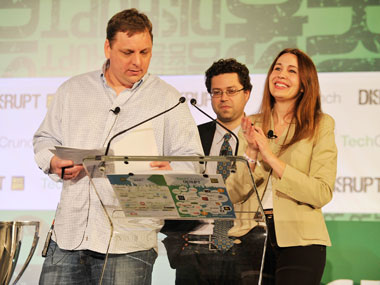Michael Arrington has resigned as managing editor of TechCrunch, which he founded in 2005, in order to launch a $20m venture capital fund called CrunchFund. Arrington has the backing of his employer, AOL, which has invested $10m, and has partnered with several other VC firms, a who’s who of Silicon Valley venture capitalists. Arrington isn’t stepping away completely from TechCrunch, as AOL spokesman Mario Ruiz explains:
Mike will run the fund and will continue to write for TechCrunch, but will have no editorial oversight.
Arrington has been an angel investor before, although he stopped in 2009 because of, as the Wall Street Journal puts it, a “perceived conflict as both publisher and investor”. That issue hasn’t gone away, as he will still be writing for TechCrunch. Although he says that transparency and full disclosure negates that conflict, it’s still possible to exert influence simply through story choice, eg by prioritising stories about start-ups from his own stable over news from competitors. [caption id=“attachment_75594” align=“alignleft” width=“380” caption=“Michael Arrington, Erick Schonfeld, and Heather Harde, speak at TechCrunch Disrupt. Getty Images.”]  [/caption] The New York Times reports that AOL “prohibits reporters at its media sites, including those at The Huffington Post, from investing in the companies they cover.” But they have made an exception for Arrington because, says AOL CEO Tim Armstrong, “TechCrunch is a different property and they have different standards.” This appears to mean that because Arrington says he’s not a journalist, and because he says he has “higher standards” that any conflict of interest is negated. This is beautiful argument by assertion: Arrington acts like a journalist, breaking news and writing stories, but he’s not to be treated like a journalist, because he says he isn’t one. This, apparently, makes the conflict of interest issue just go away. CrunchFund will be an early stage investor and, at that point in a start-up’s lifecycle, investors often get quite hands-on. Arrington has a huge address book, of course, which he can draw on to make introductions that will help his companies develop. The question for the start-ups looking for investment is whether they think that they can work with Arrington, a man who isn’t afraid to be, let’s say, assertive. Earlier this year, Vanessa Camones, head of a PR firm that works with start-ups, wrote a post titled Entrepreneurs Should Say No to Silicon Valley’s Bully, in which she urged start-ups to avoid Arrington:
TechCrunch founder and editor Michael Arrington has proven he’s willing to use TechCrunch as his personal vehicle for settling scores. It’s why I advise my clients to steer clear of him.
Camones describes how Caterina Fake, who co-founded Flickr and then went on to launch Hunch, had discovered that Arrington was going to write about a new start-up she was working on, which was still in ‘stealth mode’. She wrote about it herself, instead, scooping TechCrunch. Camones goes on:
For any normal publication, that’s where the story would end. Not with TechCrunch. Arrington went to his blog and posted the following awfulness: “Last year when she left Hunch it was an extremely sordid situation. Because of some very chatty people close to the company I had all the details about her leaving, and why. And I never posted … I’m still not going to write about why Fake really left Hunch, because it’s not something that should be written.”
The last line of Arrington’s blog post says:
Treat us with respect and you’ll get it back times ten in return. That’s all we ask.
Read between the lines and the message is clear: Play the game our way, or we screw you. Arrington is quite happy to be both controversial and confrontational. Business Insider reported on a CEO summit in New York earlier this year where Arrington “basically threatened the assembled entrepreneurs”, saying that they had to give him their stories before telling any other news outlet. He also went after a GroupMe exec after the company gave a scoop to someone else:
He pointed directly at GroupMe and yelled, “You f***ed me over.”
Impact Shorts
More ShortsAnd let’s not even get started on the women in tech furore from last year, wherein Arrington reacted to valid criticism of his male-dominated TechCrunch Disrupt events with what can only be described as a tone-deaf rant. If I was a potential CrunchFund applicant, I’d have serious concerns about how Arrington would behave in the event that we disagreed. Business, and especially entrepreneurship, is not a bed of roses. VCs are not cuddly bunnies who are there to make the start-up life easy. But trust and respect are key components of successful business relationships. As a friend once said to me about marriage: Any fool can have a relationship when life is treating you well; it’s how you deal with the tough times that defines whether your marriage survives. Business is the same, and I have seen first hand how easy it is for a start-up to tank when key relationships crumble because the CEO didn’t trust his team. All that said, I have no doubt there are plenty of hungry young entrepreneurs who are naïve enough to believe that their fledgling business can withstand a head-on collision with the speeding juggernaut that is Arrington’s personality. But seeing how Arrington has behaved in public over the years, I’m not sure how close I’d want to get to him, or his fund.


)

)
)
)
)
)
)
)
)



